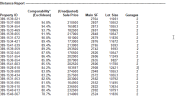- Joined
- May 20, 2011
- Professional Status
- Certified General Appraiser
- State
- Minnesota
I think you answered my question with a question, but it’s ok I’ll bite on yours.You mean in addition to the (stated) limitations to subjectivity on comp selection that have always existed? I don't know how much more the feds could clamp down beyond what already applies.
Do you consider "I have selected the properties that are most comparable" to be a primarily subjective judgement? Or can it instead be reasonably characterized as a objective judgement that can be quantified (and tested) in terms of proximity, age, Q or C ratings? I believe in the latter, and I believe that appraisers have very little discretion when it comes to which properties can and cannot be reasonably characterized as "most similar".
Matter of fact, I look for the big lie (WRT "most similar") when I review. If the subject is accurately described and reasonably rated for its attributes and if the comps presented as such really are among the most similar and if their attributes are reported with a reasonable degree of accuracy then it's usually pretty hard for the appraisal to end up with an unreasonable value conclusion. I virtually never hassle the adjustments unless they're being applied inconsistently.
I think the truthiness of the assertion can be rated on the binary basis (T) or (F)
"7. I selected and used comparable sales that are locationally, physically, and functionally the most similar to the subject property."
What do you think?
I believe two different appraisers can have non-identical comp selections, sign their certification, and deliver a USPAP compliant report.


